 As soon as Dictaphone's debut album starts, I'm immediately put into anew world where I am a private detective in a modern neo-noir film. Thestreets are unfriendly in these times, and I am one of those whoprotects the innocent, taking cases for low prices or for freesometimes, just keeping the peace. Every good detective has his crossto bear, and Dictaphone is a perfect backbone to the life of a lonerwho walks a fine line between the light and the dark. M.=Addictionis full of tracks that ooze modern cool, with electronic and livepercussion, guitar, keyboards, and live horns. The beats and groovesare jazz flavored, and the music does lean more towards that genre thanany other, but to call this music jazz would be to rob it of itsmulti-dimensional character. Each track is a different person, adifferent canvas, a different case to be solved. "Tempelhof" is thescorned lover, needy only of answers, walking the lonely streetswondering why the night has cursed her so. The title track is the shotfired in the night, striking an innocent person. Who fired the gun? Whodid they intend to hit? The awkward and sudden silence in the middle ofthe song asks a million questions in one second. It's as though thecompositions call out for justice, for the answers to these questionsthat haunt them. Few tracks have vocals, but those that do carry alittle more mystery, a little more depth, that makes the air theytravel throuh palpable. Oliver Doerell and Roger Döring have creatednot just music, but a storybook of emotions and characters that can beaccessed just by pressing play on the CD player. It is a fascinatinglisten, and I look forward to more cases to solve very soon.
As soon as Dictaphone's debut album starts, I'm immediately put into anew world where I am a private detective in a modern neo-noir film. Thestreets are unfriendly in these times, and I am one of those whoprotects the innocent, taking cases for low prices or for freesometimes, just keeping the peace. Every good detective has his crossto bear, and Dictaphone is a perfect backbone to the life of a lonerwho walks a fine line between the light and the dark. M.=Addictionis full of tracks that ooze modern cool, with electronic and livepercussion, guitar, keyboards, and live horns. The beats and groovesare jazz flavored, and the music does lean more towards that genre thanany other, but to call this music jazz would be to rob it of itsmulti-dimensional character. Each track is a different person, adifferent canvas, a different case to be solved. "Tempelhof" is thescorned lover, needy only of answers, walking the lonely streetswondering why the night has cursed her so. The title track is the shotfired in the night, striking an innocent person. Who fired the gun? Whodid they intend to hit? The awkward and sudden silence in the middle ofthe song asks a million questions in one second. It's as though thecompositions call out for justice, for the answers to these questionsthat haunt them. Few tracks have vocals, but those that do carry alittle more mystery, a little more depth, that makes the air theytravel throuh palpable. Oliver Doerell and Roger Döring have creatednot just music, but a storybook of emotions and characters that can beaccessed just by pressing play on the CD player. It is a fascinatinglisten, and I look forward to more cases to solve very soon.  As soon as Dictaphone's debut album starts, I'm immediately put into anew world where I am a private detective in a modern neo-noir film. Thestreets are unfriendly in these times, and I am one of those whoprotects the innocent, taking cases for low prices or for freesometimes, just keeping the peace. Every good detective has his crossto bear, and Dictaphone is a perfect backbone to the life of a lonerwho walks a fine line between the light and the dark. M.=Addictionis full of tracks that ooze modern cool, with electronic and livepercussion, guitar, keyboards, and live horns. The beats and groovesare jazz flavored, and the music does lean more towards that genre thanany other, but to call this music jazz would be to rob it of itsmulti-dimensional character. Each track is a different person, adifferent canvas, a different case to be solved. "Tempelhof" is thescorned lover, needy only of answers, walking the lonely streetswondering why the night has cursed her so. The title track is the shotfired in the night, striking an innocent person. Who fired the gun? Whodid they intend to hit? The awkward and sudden silence in the middle ofthe song asks a million questions in one second. It's as though thecompositions call out for justice, for the answers to these questionsthat haunt them. Few tracks have vocals, but those that do carry alittle more mystery, a little more depth, that makes the air theytravel throuh palpable. Oliver Doerell and Roger Döring have creatednot just music, but a storybook of emotions and characters that can beaccessed just by pressing play on the CD player. It is a fascinatinglisten, and I look forward to more cases to solve very soon.
As soon as Dictaphone's debut album starts, I'm immediately put into anew world where I am a private detective in a modern neo-noir film. Thestreets are unfriendly in these times, and I am one of those whoprotects the innocent, taking cases for low prices or for freesometimes, just keeping the peace. Every good detective has his crossto bear, and Dictaphone is a perfect backbone to the life of a lonerwho walks a fine line between the light and the dark. M.=Addictionis full of tracks that ooze modern cool, with electronic and livepercussion, guitar, keyboards, and live horns. The beats and groovesare jazz flavored, and the music does lean more towards that genre thanany other, but to call this music jazz would be to rob it of itsmulti-dimensional character. Each track is a different person, adifferent canvas, a different case to be solved. "Tempelhof" is thescorned lover, needy only of answers, walking the lonely streetswondering why the night has cursed her so. The title track is the shotfired in the night, striking an innocent person. Who fired the gun? Whodid they intend to hit? The awkward and sudden silence in the middle ofthe song asks a million questions in one second. It's as though thecompositions call out for justice, for the answers to these questionsthat haunt them. Few tracks have vocals, but those that do carry alittle more mystery, a little more depth, that makes the air theytravel throuh palpable. Oliver Doerell and Roger Döring have creatednot just music, but a storybook of emotions and characters that can beaccessed just by pressing play on the CD player. It is a fascinatinglisten, and I look forward to more cases to solve very soon. 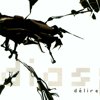 What starts off as a seemingly random collection of noise gels into anamazing conglomerate of unique sounds and atmospheres. Each unnamedtrack seems to have a consistent theme running beneath the random bellsand whistles that holds everything together. If it weren't for thiskind of consistency, Diasporawould sound totally random and become too difficult to focus on. Partof what makes a record of sounds and noises successful is the qualityof the sounds themselves: those used must be interesting and compellingor brutal and confrontational. Diaspora succeeds on this levelby employing some unusual sounds and effects. Futuristic computers, rayguns, drones of impending doom, aquatic fans, solar explosions, andalien bells are all peppered over the duration of the album. In someinstances, like the sixth and ninth tracks, these sounds are arrangedin an intriguing way, as the tracks are both heavily atmosphericglimpses into a world of nuclear winter and heavy-metal killingmachines. I find myself returning to particular songs and then becomingextremely engaged in everything that follows. As I listen to the firstfew tracks now, I realize that I am really attracted to almost everysound used. Hints of melody and coherency do emerge here and there andthe short duration of every song helps things move along nicely. Délirehas molded an album of eleven distinct tracks that belong together.Though the songs are indexed, Diaspora sounds like one longarrangement broken down into its elements. The videos included are abit less interesting than the album itself. The sounds I hear justdon't fit together with the videos in any way and it ends up makingboth the video and the music just a bit monotonous. I think of Diasporaas a collection of interesting sounds more than anything. There'snothing particularly amazing about the arrangements nor the album ingeneral, but the sounds are just so captivating that I keep wanting togo back for more.
What starts off as a seemingly random collection of noise gels into anamazing conglomerate of unique sounds and atmospheres. Each unnamedtrack seems to have a consistent theme running beneath the random bellsand whistles that holds everything together. If it weren't for thiskind of consistency, Diasporawould sound totally random and become too difficult to focus on. Partof what makes a record of sounds and noises successful is the qualityof the sounds themselves: those used must be interesting and compellingor brutal and confrontational. Diaspora succeeds on this levelby employing some unusual sounds and effects. Futuristic computers, rayguns, drones of impending doom, aquatic fans, solar explosions, andalien bells are all peppered over the duration of the album. In someinstances, like the sixth and ninth tracks, these sounds are arrangedin an intriguing way, as the tracks are both heavily atmosphericglimpses into a world of nuclear winter and heavy-metal killingmachines. I find myself returning to particular songs and then becomingextremely engaged in everything that follows. As I listen to the firstfew tracks now, I realize that I am really attracted to almost everysound used. Hints of melody and coherency do emerge here and there andthe short duration of every song helps things move along nicely. Délirehas molded an album of eleven distinct tracks that belong together.Though the songs are indexed, Diaspora sounds like one longarrangement broken down into its elements. The videos included are abit less interesting than the album itself. The sounds I hear justdon't fit together with the videos in any way and it ends up makingboth the video and the music just a bit monotonous. I think of Diasporaas a collection of interesting sounds more than anything. There'snothing particularly amazing about the arrangements nor the album ingeneral, but the sounds are just so captivating that I keep wanting togo back for more.  Anyone who has seen the turntablism documentary Scratchwill remember the scene featuring Josh Charles, AKA DJ Shadow. He stoodin the secret basement of his favorite record store (locationundisclosed, of course) amid huge stacks of dusty, obscure vinyl,explaining the philosophy and allure of "crate digging". Hisinexhaustible energy for searching out rare groove, forgotten soul, andhopelessly esoteric breakbeats has given his albums a dark, shadowyatmosphere wholly appropriate to his moniker. While most of Shadow'searly mixes were characterized by clever constructions of breakbeatsfrom rare jazz and funk instrumentals from the likes of David Axelrodand Cannonball Adderly, his recent work (with the exception of most ofhis disappointing major label album) has taken him to the farthestreaches of psychedelia and European progressive rock. Being somewhat ofa rare psych and prog enthusiast, I admire this new direction and amdownright envious of the incredibly bizarre tracks he has managed todig up for this 120-minute live BBC mix. Diminishing Returns isa new, independently released 2-CD set that comprises the entiretwo-hour BBC mix as well as a brand new bonus track. The first hour ofthe mix focuses on underground, old school and leftfield hip-hoptracks. Many of these funny, clever and/or weird raps are matched withalternate breakbeats from another source. There is no tracklisting orsample credits to be found in the nonexistent liner notes, so most ofthese artists remain completely enigmatic to me. Someone more cleverthan I should try to name all of the artists and songs used here, but Iam hopeless at blindly identifying tracks. This first part of thesession is a dynamic hour of rarely-heard hip-hop gems, but it cannothold a candle to the genius of the final 40 minutes. For this last halfof the mix, Shadow creates a seamless adventure through all thingsdusty, strange and rare, focusing on obscure psychedelic rock andstrange progressive. Some of these songs are truly off-kilter andhallucinogenic, featuring trippy, introspective vocals, effects-ladenguitar noodling and mesmerizing beats. This is an impressive assemblageof esoterica that you are guaranteed never to hear anywhere else. Ialmost expected Arcesia, the acid-addled big band leader featured on Songs in the Key of Zto come into the mix singing "Butterfly Mind." At a staggering twohours, the mix still feels tight and engaging, which is an impressivefeat. The bonus track on the disc is an average re-hash of the kind ofhip-hop/rock instrumental constructs that dominated The Private Press. Diminishing Returns is a satisfying DJ mix, right up there with gems like Coldcut's 70 Minutes of Madness.If DJ Shadow wants to retain his credibility, he needs to stay awayfrom the feeble and average material evidenced on his major labelalbum, and stick to the kind of musical integrity he displays on mixeslike this one.
Anyone who has seen the turntablism documentary Scratchwill remember the scene featuring Josh Charles, AKA DJ Shadow. He stoodin the secret basement of his favorite record store (locationundisclosed, of course) amid huge stacks of dusty, obscure vinyl,explaining the philosophy and allure of "crate digging". Hisinexhaustible energy for searching out rare groove, forgotten soul, andhopelessly esoteric breakbeats has given his albums a dark, shadowyatmosphere wholly appropriate to his moniker. While most of Shadow'searly mixes were characterized by clever constructions of breakbeatsfrom rare jazz and funk instrumentals from the likes of David Axelrodand Cannonball Adderly, his recent work (with the exception of most ofhis disappointing major label album) has taken him to the farthestreaches of psychedelia and European progressive rock. Being somewhat ofa rare psych and prog enthusiast, I admire this new direction and amdownright envious of the incredibly bizarre tracks he has managed todig up for this 120-minute live BBC mix. Diminishing Returns isa new, independently released 2-CD set that comprises the entiretwo-hour BBC mix as well as a brand new bonus track. The first hour ofthe mix focuses on underground, old school and leftfield hip-hoptracks. Many of these funny, clever and/or weird raps are matched withalternate breakbeats from another source. There is no tracklisting orsample credits to be found in the nonexistent liner notes, so most ofthese artists remain completely enigmatic to me. Someone more cleverthan I should try to name all of the artists and songs used here, but Iam hopeless at blindly identifying tracks. This first part of thesession is a dynamic hour of rarely-heard hip-hop gems, but it cannothold a candle to the genius of the final 40 minutes. For this last halfof the mix, Shadow creates a seamless adventure through all thingsdusty, strange and rare, focusing on obscure psychedelic rock andstrange progressive. Some of these songs are truly off-kilter andhallucinogenic, featuring trippy, introspective vocals, effects-ladenguitar noodling and mesmerizing beats. This is an impressive assemblageof esoterica that you are guaranteed never to hear anywhere else. Ialmost expected Arcesia, the acid-addled big band leader featured on Songs in the Key of Zto come into the mix singing "Butterfly Mind." At a staggering twohours, the mix still feels tight and engaging, which is an impressivefeat. The bonus track on the disc is an average re-hash of the kind ofhip-hop/rock instrumental constructs that dominated The Private Press. Diminishing Returns is a satisfying DJ mix, right up there with gems like Coldcut's 70 Minutes of Madness.If DJ Shadow wants to retain his credibility, he needs to stay awayfrom the feeble and average material evidenced on his major labelalbum, and stick to the kind of musical integrity he displays on mixeslike this one. 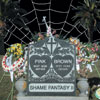 The guitarist dressed in silly pink stocking apparel that masked hisidentity. The drummer dressed much the same but in brown. If they gaveinterviews, I guess its fairly unlikely they got asked, "So why did youcall the band Pink and Brown?" Imagine Oxes stripped down to a lowerdensity screechier hollerin' clobberin' combo and you'd have a fairlygood idea of where these two light-hearted heavy-handed San Franciscoscene stalwarts were coming from. Actually you'd probably have a bandwho sound so much like Arab On Radar that they could be the same sillypost-punkers, albeit with the vocals mixed lower or not at all. As forwhere they're going to, who knows? Brown plays in Young People whosounded like Cat Power might if she got some interesting noises intoher guitar and wrote better songs on the one song I heard. Pink playsin a bunch of other bands I've never heard. But I have heard this CDand can say that compiling everything they released before giving upthis fancy dress gig was a pretty good idea and if you've ever groovedto the kind of jagged rock storms that the Skin Graft label served upin abundance, you'll probably have a pretty good time at the Pink andBrown party. Its itchy, scratchy nerd rock as opposed to math rock,because these are the kids who burnt their homework and ran through thestreets squealing with socks pulled over their heads. The vinyl versionof this album only features the five new songs they recorded on NewYears day 2003 so unless you were a completist Pink and Brown fan, theCD seems a better bet, as there are 22 tracks on that. But how doesthis rate on my Loadometer? Not as madcap noisefried as Lightning Boltor Sightings, but a lot more fun than Neon Hunk. Don't even think aboutgetting this until you have that stompin' Noxagt album on Load which Ireviewed a few weeks back
The guitarist dressed in silly pink stocking apparel that masked hisidentity. The drummer dressed much the same but in brown. If they gaveinterviews, I guess its fairly unlikely they got asked, "So why did youcall the band Pink and Brown?" Imagine Oxes stripped down to a lowerdensity screechier hollerin' clobberin' combo and you'd have a fairlygood idea of where these two light-hearted heavy-handed San Franciscoscene stalwarts were coming from. Actually you'd probably have a bandwho sound so much like Arab On Radar that they could be the same sillypost-punkers, albeit with the vocals mixed lower or not at all. As forwhere they're going to, who knows? Brown plays in Young People whosounded like Cat Power might if she got some interesting noises intoher guitar and wrote better songs on the one song I heard. Pink playsin a bunch of other bands I've never heard. But I have heard this CDand can say that compiling everything they released before giving upthis fancy dress gig was a pretty good idea and if you've ever groovedto the kind of jagged rock storms that the Skin Graft label served upin abundance, you'll probably have a pretty good time at the Pink andBrown party. Its itchy, scratchy nerd rock as opposed to math rock,because these are the kids who burnt their homework and ran through thestreets squealing with socks pulled over their heads. The vinyl versionof this album only features the five new songs they recorded on NewYears day 2003 so unless you were a completist Pink and Brown fan, theCD seems a better bet, as there are 22 tracks on that. But how doesthis rate on my Loadometer? Not as madcap noisefried as Lightning Boltor Sightings, but a lot more fun than Neon Hunk. Don't even think aboutgetting this until you have that stompin' Noxagt album on Load which Ireviewed a few weeks back There are altogether too many various artist compilations currently outin the market that presume to document a particular musical scene or,worse, claim to serve as a kind of audio history lesson. All of thesereleases seem to be suggesting that they are the "final word" on aparticular genre or scene. Most fall far short of this goal. Recently,Rough Trade released a "post punk" primer, which included a few greatrarities from the original era like Liquid Liquid and World DominationEnterprises, together with a bunch of head-scratchingly inappropriateinclusions from newer artists. Very little thought seems to be given totrack sequencing in most cases, making for an uneven listen that ismore annoying that it is educational. Many of these compilations alsorecycle the same tracks that have appeared on numerous other releases.I can count on one hand the number of compilations that I have found tobe valuable, and among them is Soul Jazz's In The Beginning, There Was Rhythmfrom 2001. True, some of the tracks included were widely available onCD already, but the selection and sequencing of tracks was trulyinspired. So, I had high hopes for the newest Soul Jazz "music history"comp, New York Noise: Dance Music From the New York Underground1978-1982. The compilers have attempted to marry the disparate genresof post-punk dance, underground disco, no-wave and hip-hop under onebig NYC banner. With a few exceptions, they succeed. Liquid Liquid's"Optimo" is a great starting point, combining African rhythms and punkurgency into a tense, funky groove. Filling out the "mutant disco"quotient are rare selections from Konk, The Dance and The Bloods. BillLaswell's Material are included, with a dialogue-sampling disco-housemeltdown that sounds way ahead of its time. NYC underground avant-discoprodigy Arthur Russell is here under his Dinosaur L guise, with thetypically brilliant "Clean on Your Bean #1". It's nice to hear thiscrisply remastered song without having to shell out $700 for theoriginal 12" on Sleeping Bag. ESG and The Bush Tetras represent for theladies with a couple estrogen-fueled funk tracks. Defunkt's "Defunkt"seems a little out of place; it's nice, but a rather typical late-70'sdisco-funk number. Rahmelzee vs. K. Rob's long-winded "Beat Bop" standsalong with Grandmaster Flash's "White Lines" as a masterpiece of thefirst era of NYC hip-hop. I'm not sure what the compilers were thinkingby the inclusion of DNA, MARS and The Contortions. Sure, these bandswere included on the epochal 1978 No New York LP which defined theno-wave aesthetic, but does this qualify as dance music? Only anepileptic on ecstasy would try to dance to these noisy, herky-jerkyrhythms. Ditto Glenn Branca's eight-minute, multiple-guitar fantasia"Lesson No.1." These tracks are all quite good, but they stick out likea sore thumb on a so-called "dance music" compilation. These are minorquibbles, however, as the music is brilliant, and MARS' "HelenFordsdale" has always been my favorite track from the No New Yorkcompilation. Words are insufficient to describe the drama and intensityof this two-and-a-half minute explosion of rock n' roll chaos. All inall, New York Noise is a valuable compilation for those of us who don'tmind pedantic compilers giving us a lesson in musical history.
There are altogether too many various artist compilations currently outin the market that presume to document a particular musical scene or,worse, claim to serve as a kind of audio history lesson. All of thesereleases seem to be suggesting that they are the "final word" on aparticular genre or scene. Most fall far short of this goal. Recently,Rough Trade released a "post punk" primer, which included a few greatrarities from the original era like Liquid Liquid and World DominationEnterprises, together with a bunch of head-scratchingly inappropriateinclusions from newer artists. Very little thought seems to be given totrack sequencing in most cases, making for an uneven listen that ismore annoying that it is educational. Many of these compilations alsorecycle the same tracks that have appeared on numerous other releases.I can count on one hand the number of compilations that I have found tobe valuable, and among them is Soul Jazz's In The Beginning, There Was Rhythmfrom 2001. True, some of the tracks included were widely available onCD already, but the selection and sequencing of tracks was trulyinspired. So, I had high hopes for the newest Soul Jazz "music history"comp, New York Noise: Dance Music From the New York Underground1978-1982. The compilers have attempted to marry the disparate genresof post-punk dance, underground disco, no-wave and hip-hop under onebig NYC banner. With a few exceptions, they succeed. Liquid Liquid's"Optimo" is a great starting point, combining African rhythms and punkurgency into a tense, funky groove. Filling out the "mutant disco"quotient are rare selections from Konk, The Dance and The Bloods. BillLaswell's Material are included, with a dialogue-sampling disco-housemeltdown that sounds way ahead of its time. NYC underground avant-discoprodigy Arthur Russell is here under his Dinosaur L guise, with thetypically brilliant "Clean on Your Bean #1". It's nice to hear thiscrisply remastered song without having to shell out $700 for theoriginal 12" on Sleeping Bag. ESG and The Bush Tetras represent for theladies with a couple estrogen-fueled funk tracks. Defunkt's "Defunkt"seems a little out of place; it's nice, but a rather typical late-70'sdisco-funk number. Rahmelzee vs. K. Rob's long-winded "Beat Bop" standsalong with Grandmaster Flash's "White Lines" as a masterpiece of thefirst era of NYC hip-hop. I'm not sure what the compilers were thinkingby the inclusion of DNA, MARS and The Contortions. Sure, these bandswere included on the epochal 1978 No New York LP which defined theno-wave aesthetic, but does this qualify as dance music? Only anepileptic on ecstasy would try to dance to these noisy, herky-jerkyrhythms. Ditto Glenn Branca's eight-minute, multiple-guitar fantasia"Lesson No.1." These tracks are all quite good, but they stick out likea sore thumb on a so-called "dance music" compilation. These are minorquibbles, however, as the music is brilliant, and MARS' "HelenFordsdale" has always been my favorite track from the No New Yorkcompilation. Words are insufficient to describe the drama and intensityof this two-and-a-half minute explosion of rock n' roll chaos. All inall, New York Noise is a valuable compilation for those of us who don'tmind pedantic compilers giving us a lesson in musical history.- Liquid Liquid - Optimo
- Dinosaur L - Clean on Your Bean #1
- MARS - Helen Fordsdale
 It's difficult to believe that The Clientele have only gotten around to releasing a full length album now, six years after they appeared on the Fierce Panda 7" compilation, Cry Me a Liver. Although the London-based trio have released a steady stream of 7" singles, EPs, and even a critically acclaimed singles compilation in 2000, The Violet Hour finds the band exploring a larger framework and expanding their sound. Overall, the production sounds more focused than their previous efforts, though it does retain much of the charming muddiness of some of their earliest releases such as "All the Dust and Glass."
It's difficult to believe that The Clientele have only gotten around to releasing a full length album now, six years after they appeared on the Fierce Panda 7" compilation, Cry Me a Liver. Although the London-based trio have released a steady stream of 7" singles, EPs, and even a critically acclaimed singles compilation in 2000, The Violet Hour finds the band exploring a larger framework and expanding their sound. Overall, the production sounds more focused than their previous efforts, though it does retain much of the charming muddiness of some of their earliest releases such as "All the Dust and Glass."
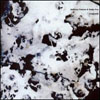 There is a long dark and wet tunnel ahead of me and at its end is apartially opened door with a faint blue glow pulsing from within:something horrible is happening inside and it scares me. I walk forwardcautiously and peer inside and then each of my senses is assaulted tothe point of death. I am left with only my hearing and tactile sensesto manouevre a large and very dangerous habitat. The dry wheezes ofbroken machinery, the incoherent babble of hyper morons, and the soundof a thousand tiny legs echo and rebound all about me. Distant moansdart down long corridors and bring messages of pain and incomingmisanthropy. There is some shelter, some spaces to breathe in withoutfear of being heard by whatever it is that's out there. Pacifying bellsflow somewhere in the distance and the gentle hum of computers becomesa lullaby for my weary head. Hell is still out there somewhere, though.Before long screams demolish the walls and send chills down my spine.No matter where I run these sounds follow me. My hands press againstthe cold and metallic walls hoping to find some familiar nook or somesemblance of home. There's nothing here that I recognize. This is anutterly alien world. Eventually I fall asleep and those same soundshaunt my dreams only they are perverted. Everything has slowed downwith only momentary stabs of pain. The sound of water dripping to thefloor wakes me and I bathe in it happily: here finally is some relief.I lay back and drift in the clear blue water staring at the sun andwonder to myself: did I ever wake up from that dream? Was I ever evenawake at all?
There is a long dark and wet tunnel ahead of me and at its end is apartially opened door with a faint blue glow pulsing from within:something horrible is happening inside and it scares me. I walk forwardcautiously and peer inside and then each of my senses is assaulted tothe point of death. I am left with only my hearing and tactile sensesto manouevre a large and very dangerous habitat. The dry wheezes ofbroken machinery, the incoherent babble of hyper morons, and the soundof a thousand tiny legs echo and rebound all about me. Distant moansdart down long corridors and bring messages of pain and incomingmisanthropy. There is some shelter, some spaces to breathe in withoutfear of being heard by whatever it is that's out there. Pacifying bellsflow somewhere in the distance and the gentle hum of computers becomesa lullaby for my weary head. Hell is still out there somewhere, though.Before long screams demolish the walls and send chills down my spine.No matter where I run these sounds follow me. My hands press againstthe cold and metallic walls hoping to find some familiar nook or somesemblance of home. There's nothing here that I recognize. This is anutterly alien world. Eventually I fall asleep and those same soundshaunt my dreams only they are perverted. Everything has slowed downwith only momentary stabs of pain. The sound of water dripping to thefloor wakes me and I bathe in it happily: here finally is some relief.I lay back and drift in the clear blue water staring at the sun andwonder to myself: did I ever wake up from that dream? Was I ever evenawake at all? 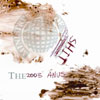 As featured on NPR, Australian Luke Collision, a.k.a. Dsico is comingforth as being one of the stars of the mash-up. His label, Spasticatedhas issued this: a parody wrapped in irony and threatened by a lawsuit.Released in a limited quantity of 500, all the contributors to Ministry of Shit are probably well aware that mash-ups are becoming a trendy thing to do, however, cleverly masked as a dreadful Ministry of Sound compilation, it's easy to forgive them for making a mockery of a larger, even more obnoxious trend. For those fans of The Best Bootlegs in The World,this is a brand new compilation to go on the shelf. Contained hereinare plenty of all-new illegal remixes of Eminem, Madonna, JustinTimberlake and other pop icons. Some are clever and frighteningmutations (yes, it's possible to make Avril Lavigne's voice evenworse!) while many others like Dsico's "I R*cked Britney," are modernremixes. (I wish I knew where Toecutter's "Shit on Me" actually camefrom - it's got far more sex than the entire Nymphomatriarch releaseand if it weren't for the FCC, I'd be playing this song on my radioshow all the time.) AC/3P's "Oi," on the other hand is just a downrightgratuitous, revolting cover with unbearable vocals. Luckily there'splenty of variety on the compilation to not make this sound like thesame track over and over again. The disc closes much like apull-my-finger fart joke that actually is funny every time (I keepthinking of a South Park episode from this year), and with the piggyreference, "Ice Ice Bacon" can only be Stockport's finest V/Vm crew(come on, the artist name is Trotters). My hope is that this compactually finds its way into peoples hands by grotesque mistake (sorecord store clerks, look for it and strategically shove it in thewrong place). With any luck, something like this can potentially openthe eyes of consumers looking to get a moronic dance fix; findsomething this amusing, stupid, and clever; and leave the regular shitbehind. As a bonus, a crafty remixed video of Dsico's "I R*cked Britney(Moonwalk Style)" (combining the white guy who thinks he's black withthe black guy who thinks he's white) is included in the data portion ofthe CD.
As featured on NPR, Australian Luke Collision, a.k.a. Dsico is comingforth as being one of the stars of the mash-up. His label, Spasticatedhas issued this: a parody wrapped in irony and threatened by a lawsuit.Released in a limited quantity of 500, all the contributors to Ministry of Shit are probably well aware that mash-ups are becoming a trendy thing to do, however, cleverly masked as a dreadful Ministry of Sound compilation, it's easy to forgive them for making a mockery of a larger, even more obnoxious trend. For those fans of The Best Bootlegs in The World,this is a brand new compilation to go on the shelf. Contained hereinare plenty of all-new illegal remixes of Eminem, Madonna, JustinTimberlake and other pop icons. Some are clever and frighteningmutations (yes, it's possible to make Avril Lavigne's voice evenworse!) while many others like Dsico's "I R*cked Britney," are modernremixes. (I wish I knew where Toecutter's "Shit on Me" actually camefrom - it's got far more sex than the entire Nymphomatriarch releaseand if it weren't for the FCC, I'd be playing this song on my radioshow all the time.) AC/3P's "Oi," on the other hand is just a downrightgratuitous, revolting cover with unbearable vocals. Luckily there'splenty of variety on the compilation to not make this sound like thesame track over and over again. The disc closes much like apull-my-finger fart joke that actually is funny every time (I keepthinking of a South Park episode from this year), and with the piggyreference, "Ice Ice Bacon" can only be Stockport's finest V/Vm crew(come on, the artist name is Trotters). My hope is that this compactually finds its way into peoples hands by grotesque mistake (sorecord store clerks, look for it and strategically shove it in thewrong place). With any luck, something like this can potentially openthe eyes of consumers looking to get a moronic dance fix; findsomething this amusing, stupid, and clever; and leave the regular shitbehind. As a bonus, a crafty remixed video of Dsico's "I R*cked Britney(Moonwalk Style)" (combining the white guy who thinks he's black withthe black guy who thinks he's white) is included in the data portion ofthe CD.- Wobbly - Let Me Know
- Toecutter - Shit On Me
- Trotter - Ice Ice Bacon
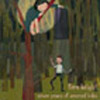 Lullabies and fairy tales can possess certain qualities that belietheir gentle names, and might well inspire sleepless nights as opposedto sweet dreams. The former speak of helpless, cradle-bound babiesfalling to their certain doom, and anyone who has glanced through theoriginal stories of the brothers Grimm knows that their name was arather apt description of their stories' conclusions. It's amazing howa soothing voice or an impeccable melody can assuage the rather irksomefeel of the gothic subject matter. On 'Seven Years of Seven Limbs,'Fern Knight (comprised of ex-Difference Engine members Margie Wienk andMike Corcoran) has given us a collection of their own folktales thatplay with darker shades of storytelling imbued with a fairy tale likesense of wonder. From the outset of "She Who Was So Precious to You,"we find a sparse arrangement of acoustic guitar and strings that arelit up by Wienk's gorgeous vocals, like a shaft of sunlight peekingthrough a dark thicket of dead trees. The lyrics are foreboding andpresents us with the first of many moments of grotesque beauty, "If thefull moon won't illuminate us / if the wine glass won't even stay full/ if the wolf won't eliminate you / then I will." It is a series ofimages so vibrant, so enticingly conveyed that you're pulled in; andyet they are also full of malice. This malevolence is undercut somewhatby a desolate feeling, as in "Chelyabinsk," which gives off a sense ofgreat distance and overwhelming loss that has settled into fear andregret. In "Boxing Day", Wienk dons a red riding hood, declaring "Idon't think it's okay to be going downhill with you" to whoever orwhatever serves as the big bad wolf in her emotional dark forest. Thesong begins with the twang of a slide guitar, however over the courseof its seven minutes, it loses the plot and begins to drift off of itsstructure finally dissolving into a wispy collection of church bells,alarm calls, and telephone ringers before segueing into the rain andstreet noise intro of "Mover Ghost." In the waning minutes of the disc,the metaphor and imagery of the wolves, the dark forests and watchfulmoons begins to fade away in favor of more literal expressions of theconflicts they embodied. "Make your record of it / You're such an easytarget / mark those days off on your wall." The distance is nowmeasured in time, not symbolized by some far off Russian outpost.'Seven Years of Severed Limbs' closes with the stunningly beautiful"Dog Named Summer," loaded full with an impeccable melody and moresoaring vocals that shape the scene of that golden yellow summer sundipping below the rooftops, the heaviness of the heat and the method ofyour movements. Fern Knight draws a slow story, one that makes for anexcellent tale that explores those winding forest paths and the thingsthat lie hidden between the lines
Lullabies and fairy tales can possess certain qualities that belietheir gentle names, and might well inspire sleepless nights as opposedto sweet dreams. The former speak of helpless, cradle-bound babiesfalling to their certain doom, and anyone who has glanced through theoriginal stories of the brothers Grimm knows that their name was arather apt description of their stories' conclusions. It's amazing howa soothing voice or an impeccable melody can assuage the rather irksomefeel of the gothic subject matter. On 'Seven Years of Seven Limbs,'Fern Knight (comprised of ex-Difference Engine members Margie Wienk andMike Corcoran) has given us a collection of their own folktales thatplay with darker shades of storytelling imbued with a fairy tale likesense of wonder. From the outset of "She Who Was So Precious to You,"we find a sparse arrangement of acoustic guitar and strings that arelit up by Wienk's gorgeous vocals, like a shaft of sunlight peekingthrough a dark thicket of dead trees. The lyrics are foreboding andpresents us with the first of many moments of grotesque beauty, "If thefull moon won't illuminate us / if the wine glass won't even stay full/ if the wolf won't eliminate you / then I will." It is a series ofimages so vibrant, so enticingly conveyed that you're pulled in; andyet they are also full of malice. This malevolence is undercut somewhatby a desolate feeling, as in "Chelyabinsk," which gives off a sense ofgreat distance and overwhelming loss that has settled into fear andregret. In "Boxing Day", Wienk dons a red riding hood, declaring "Idon't think it's okay to be going downhill with you" to whoever orwhatever serves as the big bad wolf in her emotional dark forest. Thesong begins with the twang of a slide guitar, however over the courseof its seven minutes, it loses the plot and begins to drift off of itsstructure finally dissolving into a wispy collection of church bells,alarm calls, and telephone ringers before segueing into the rain andstreet noise intro of "Mover Ghost." In the waning minutes of the disc,the metaphor and imagery of the wolves, the dark forests and watchfulmoons begins to fade away in favor of more literal expressions of theconflicts they embodied. "Make your record of it / You're such an easytarget / mark those days off on your wall." The distance is nowmeasured in time, not symbolized by some far off Russian outpost.'Seven Years of Severed Limbs' closes with the stunningly beautiful"Dog Named Summer," loaded full with an impeccable melody and moresoaring vocals that shape the scene of that golden yellow summer sundipping below the rooftops, the heaviness of the heat and the method ofyour movements. Fern Knight draws a slow story, one that makes for anexcellent tale that explores those winding forest paths and the thingsthat lie hidden between the lines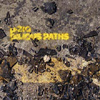 After several years of collaborative and one-off solo projects, Mike Paradinas finally returns to the moniker that he is most recognized for. Threatened to be his final µ-ziq album, Bilious Paths offers 53 thrilling minutes of eclectic electronics, including bits of hardcore, funk, hip-hop, 2-step, rave and, of course, drill n bass.
After several years of collaborative and one-off solo projects, Mike Paradinas finally returns to the moniker that he is most recognized for. Threatened to be his final µ-ziq album, Bilious Paths offers 53 thrilling minutes of eclectic electronics, including bits of hardcore, funk, hip-hop, 2-step, rave and, of course, drill n bass.



